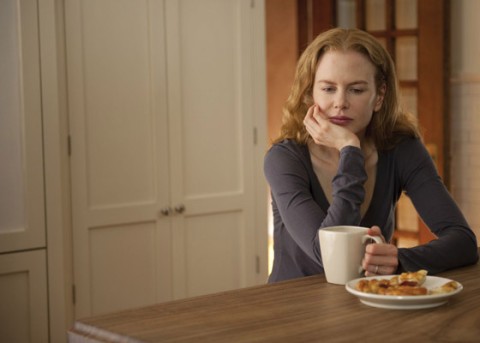Rabbit Hole: Directed by John Cameron Mitchell

Rabbit Hole, adapted by David Lindsay-Abaire from his Pulitzer Prize–winning play about a couple struggling to cope with the death of their little boy, has a limited imaginative reach. But the familiar can wield considerable power when the writing is honest and specific. The film, beautifully directed by John Cameron Mitchell, is extremely affecting.
Late in the movie, Becca (Nicole Kidman) and her mother, Nat (Dianne Wiest), are sorting the contents of the dead child's room. Since the car accident that killed him several months earlier, Nat's attempts to counsel Becca by drawing parallels between her daughter's loss and her own—Becca's older brother, who died of a heroin overdose at 30—have aroused indignation and resistance in Becca. But now she finally invites Nat to talk about the grieving process. Grief doesn't ever go away, Nat explains, but the weight of it changes, and it becomes like a brick in your pocket that you always have: you don't like it, exactly, but it's what you have instead of your son so you carry it around with you.
Read our latest issue or browse back issues.
Lindsay-Abaire's model—like that of most American realist playwrights writing family drama—is Eugene O'Neill's Long Day's Journey into Night, but Lindsay-Abaire isn't a dramatic poet like O'Neill; his style is too heavy and obvious to soar. Still, this is a well-crafted piece of writing, precise and modulated, and it does its job.
The conflict between Becca and her husband, Howie (Aaron Eckhart), arises from their different modes of handling loss. Howie dwells on remnants of his son, Danny—like home-video images—while Becca finds these reminders so painful that she sets about getting rid of them, which infuriates Howie. Grief wears away at Becca's social filter and makes her aggressive. She responds caustically to the faith expressed by other members of the weekly survivors' group they attend, and she gets impatient with those who have been coming to these meetings for nearly a decade—to her mind, they're wallowers.
As for Howie, he finds it helps him to lighten up by getting stoned before the meetings with Gaby (Sandra Oh), one of the other attendees, whose husband has left her. Lindsay-Abaire invented the role of Gaby for the movie version, and she's a helpful addition. She holds out sexual possibilities for Howie, who has not been able to make love to his wife since their boy died; when he tries, she accuses him of roping her into sex by playing Al Green on the stereo, behaving as if their lives could ever become normal again. (Though neither of them alludes to it, Becca is also pushing away the idea of having another child to replace Danny.)
The strength of the movie is partly its ensemble, which includes Tammy Blanchard as Becca's younger sister, Izzy, and the amazing young actor Miles Teller as Jason, the sensitive and gifted teenager who was driving the car that hit Danny. Teller gives a delicate performance as a boy who carries his guilt around in his bombed-out face. In one scene, he admits to Becca that he might have been driving one or two miles above the speed limit when he rounded the corner onto their street the day Danny ran out in front of the car, and you realize that he's been holding on to this secret as if it were proof of culpability.
Eckhart and Wiest contribute fine portrayals. Kidman is perfectly competent, but her tiny voice limits her expressive range, and she never comes close to suggesting the dangerous fury that Cynthia Nixon, who played the role on Broadway, barely kept in abeyance.
Rabbit Hole is filled with small details that make it feel like it emerged from someone's real experience. When Becca and Howie argue in the car, he has to stop short so he won't ram into the car ahead of them. Becca reflexively whirls around to check the back seat, as if there were still a little boy there whose safety she had to ensure.






